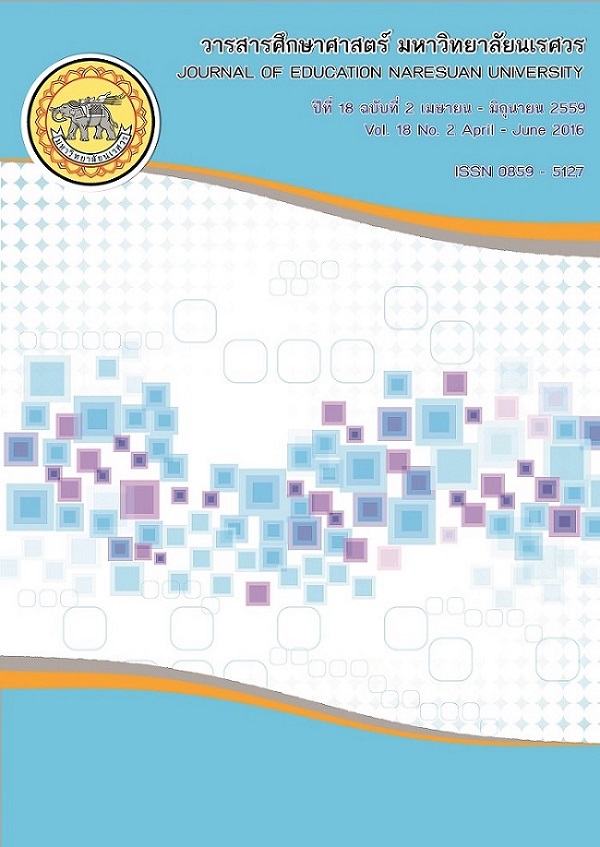การพัฒนารูปแบบการจัดประสบการณ์ตามแนวคิดสมองเป็นฐาน และการเรียนรู้แบบร่วมมือที่ส่งเสริมทักษะกระบวนการ ทางวิทยาศาสตร์สำหรับเด็กปฐมวัย
Main Article Content
Abstract
บทคัดย่อ
การวิจัยในครั้งนี้มีวัตถุประสงค์เพื่อพัฒนารูปแบบการจัดประสบการณ์ตามแนวคิดสมองเป็นฐานและการเรียนรู้แบบร่วมมือที่ส่งเสริมทักษะกระบวนการทางวิทยาศาสตร์สำหรับเด็กปฐมวัย โดยมีวัตถุประสงค์เฉพาะ คือ 1) เพื่อสร้างและหาคุณภาพของรูปแบบการจัดประสบการณ์ตามแนวคิดสมองเป็นฐานและการเรียนรู้แบบร่วมมือที่ส่งเสริมทักษะกระบวนการทางวิทยาศาสตร์สำหรับเด็กปฐมวัย และ 2) เพื่อศึกษาผลการใช้รูปแบบการจัดประสบการณ์ตามแนวคิดสมองเป็นฐานและการเรียนรู้แบบร่วมมือที่ส่งเสริมทักษะกระบวนการทางวิทยาศาสตร์สำหรับเด็กปฐมวัย
การวิจัยดำเนินการตามกระบวนการวิจัยและพัฒนา (Research and Development) แบ่งออกเป็น 2 ขั้นตอน คือ ขั้นตอนที่ 1 สร้างและหาคุณภาพของรูปแบบการเรียนการสอน ขั้นตอนที่ 2 การใช้และศึกษาผลการใช้รูปแบบการเรียนการสอน กลุ่มตัวอย่าง ได้แก่ นักเรียนชั้นอนุบาลปีที่ 2 โรงเรียนอนุบาลอุตรดิตถ์ สังกัดสำนักงานเขตพื้นที่การศึกษาประถมศึกษาอุตรดิตถ์ เขต 1 ภาคเรียนที่ 1 ปีการศึกษา 255 ซึ่งได้มาจากการสุ่มแบบเจาะจง (Purposive Sampling) เครื่องมือที่ใช้ในการวิจัย ได้แก่ แบบทดสอบวัดทักษะกระบวนการทางวิทยาศาสตร์ เป็นแบบเลือกตอบ แบบทดสอบฉบับนี้ ผ่านการตรวจสอบความตรงเชิงเนื้อหาโดยผู้เชี่ยวชาญ จำนวน 5 คน มีค่า IOC ตั้งแต่ 0.60 ขึ้นไป และผ่านการทดลองใช้กับนักเรียนชั้นอนุบาลปีที่ 2 จำนวน 35 คนที่ไม่ใช่กลุ่มตัวอย่าง มีค่าอำนาจจำแนกเท่ากับ 0.72 และมีค่าความเที่ยงเท่ากับ 0.89 ดำเนินการวิเคราะห์ข้อมูลโดยหาค่าเฉลี่ย ส่วนเบี่ยงเบนมาตรฐาน การทดสอบทีแบบไม่อิสระ
ผลการวิจัย พบว่า
1. ผลการสร้างและหาคุณภาพของรูปแบบการจัดประสบการณ์ตามแนวคิดสมองเป็นฐานและการเรียนรู้แบบร่วมมือที่ส่งเสริมทักษะกระบวนการทางวิทยาศาสตร์สำหรับเด็กปฐมวัย พบว่า
1.1 รูปแบบการจัดประสบการณ์ที่พัฒนาคือ รูปแบบการจัดประสบการณ์ตามแนวคิดสมองเป็นฐานและการเรียนรู้แบบร่วมมือที่ส่งเสริมทักษะกระบวนการทางวิทยาศาสตร์สำหรับเด็กปฐมวัย ที่สร้างขึ้น มี 5 องค์ประกอบ ได้แก่ หลักการ วัตถุประสงค์ เนื้อหา กระบวนการจัดกิจกรรมการเรียนการสอน และการวัดและประเมินผล รูปแบบการเรียนการสอนนี้ มีชื่อ PTPRA Model มีกระบวนการเรียนรู้ดังนี้ 1) ขั้นเตรียมความพร้อม (Preparation: P) 2) ขั้นเชื่อมโยงความคิด (Transfer: T) 3) ขั้นปฏิบัติร่วมเรียนรู้ (Practicing: P) 4) ขั้นสะท้อนคิดร่วมกัน (Reflecting: R) 5) ขั้นชื่นชมผลงาน (Assessment: A) ผลการตรวจสอบคุณภาพโดยผู้ทรงคุณวุฒิ พบว่า รูปแบบการจัดประสบการณ์ที่พัฒนามีความเหมาะสมอยู่ในระดับมาก
(= 4.26, S.D. = 0.21)
1.2 ดัชนีประสิทธิผลของรูปแบบการจัดประสบการณ์ตามแนวคิดสมองเป็นฐานและการเรียนรู้แบบร่วมมือที่ส่งเสริมทักษะกระบวนการทางวิทยาศาสตร์สำหรับเด็กปฐมวัย มีค่าเท่ากับ 0.72
2. ผลการใช้รูปแบบการจัดประสบการณ์ตามแนวคิดสมองเป็นฐานและการเรียนรู้แบบร่วมมือที่ส่งเสริมทักษะกระบวนการทางวิทยาศาสตร์สำหรับเด็กปฐมวัย ที่พัฒนาขึ้น พบว่า
2.1 นักเรียนมี่พัฒนาการทักษะกระบวนการทางวิทยาศาสตร์ อยู่ในระดับสูง
2.2 นักเรียนมีทักษะกระบวนการทางวิทยาศาสตร์หลังเรียนสูงกว่าก่อนเรียน อย่างมีนัยสำคัญทางสถิติที่ระดับ .01
คำสำคัญ: รูปแบบการจัดประสบการณ์, แนวคิดสมองเป็นฐาน, การเรียนรู้แบบร่วมมือ, ทักษะกระบวนการทางวิทยาศาสตร์สำหรับเด็กปฐมวัย
THE DEVELOPMENT OF AN EXPERIENTIAL MODEL BASED ON BRAIN - BASED AND COOPERATIVE LEARNING FOR SCIENCE PROCESS SKILLS FOR EARLY CHILDHOOD STUDENTS
The purpose of this research was the development of an experiential model based on brain – based and cooperative learning for science process skills for early childhood students. The specific purposes of this research were to develop and assess the quality of the model and study the results of using the model.
The research procedure comprised two steps. There were 1) to develop and assess the quality of the model, and 2) to study the results of using the model. The samples used for the experiment was one classroom in Anuban School Uittaradit of Primary Education Service Area office 1. In the 1st semester of the 2014 academic year, drawn by means of cluster random sampling. The research instruments were a multiple-choice test of Achievement in science process skills for early childhood student, checking content validity by 5 experts. The Index of Congruence was 0.60 up,and 35 early childhood students who were not the experimental sample were used for checking the research instrument for qualities in terms of discrimination was 0.72 and realiabilities was 0.89 The statistic use for data analyzed were percentage, mean, standard deviation., and t-test dependent samples
The results of the research were as follows:
1. The results and the quality of an experiential model there were found that:
1.1 The developed experiential model consisted of five components: principles, objectives, contents, teaching and learning process, assessment and evaluation. The developed model is called PTPRA Model consisted of Preparation: P, Transfer: T, Practicing: P, Reflecting: R, Assessment: A. It was at high levels of appropriateness. The model was verified by the experts and it was found that a peer an experiential model developed at the appropriate level (= 4.26, S.D. = 0.21)
1.2 The effectiveness index of an experiential model based on brain – based and cooperative learning for science skills for early childhood is equal to 0.72.
2. The experimental results of using an experiential model, indicate
2.1 The students had science process skills for early childhood after learned through the experiential developed model higher than before using developed model.
2.2 The students had achievement score of science process skills for early childhood after learned with the developed model higher than before at the .01 level of statistical significance.
Keywords: Experiential Model, Brain – based Learning, Cooperative Learning, Science Process Skills for Early Childhood Students
Article Details
The owner of the article does not copy or violate any of its copyright. If any copyright infringement occurs or prosecution, in any case, the Editorial Board is not involved in all the rights to the owner of the article to be performed.


